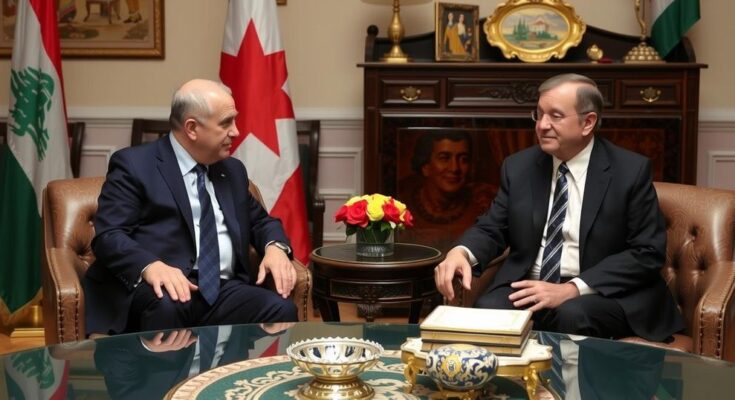Lebanon’s caretaker Prime Minister Najib Mikati visited Damascus for discussions with Syria’s de facto leader, Ahmed al-Sharaa, marking the first visit by a sitting Lebanese premier in over a decade. The meeting follows Syria’s political transition post-Assad and comes amid rising tensions between Lebanon and Syria, including border security issues. Additionally, newly-elected President Joseph Aoun is set to visit Saudi Arabia, emphasizing international support for Lebanon’s recovery.
On January 11, Lebanon’s caretaker Prime Minister Najib Mikati visited Damascus for discussions with Syria’s de facto leader, Ahmed al-Sharaa. This marks the first visit by a sitting Lebanese premier to Syria in over ten years. Mikati’s delegation, which included Foreign Minister Abdallah Bou Habib and leading security figures, arrived in Damascus following an invitation from al-Sharaa made last week during a telephone call.
The backdrop of this meeting is significant; it occurs as Syria goes through a political transition after the removal of former President Bashar al-Assad last December. Al-Sharaa, who played a vital role in the coalition that ousted al-Assad, is now focused on stabilizing Syria and enhancing its regional ties.
Recent tensions between Lebanon and Syria have escalated, particularly following Syria’s introduction of restrictions on cross-border travel due to security incidents along their shared border. This situation has complicated matters further as there have been clashes involving Syrian armed groups and Lebanese forces that have resulted in injuries among Lebanese military personnel.
Simultaneously, newly-elected Lebanese President Joseph Aoun announced plans to visit Saudi Arabia, following an invitation from Crown Prince Mohammed bin Salman Al Saud. This visit, set to be Aoun’s first foreign trip as President, underlines Saudi Arabia’s critical role in Lebanon’s recovery efforts. Aoun was elected as Lebanon’s 14th President with 99 of 128 parliamentary votes, concluding a two-year vacancy in the presidential office.
The visit of caretaker Prime Minister Najib Mikati to Syria is historically significant for Lebanon, as it marks the first engagement of its kind in a decade. This meeting takes place during a pivotal time in Syria, which is experiencing a political realignment following the ousting of Bashar al-Assad. With al-Sharaa at the helm, Syria is looking to rebuild its international relations and establish stability amidst ongoing regional turmoil. Lebanon has faced its share of challenges, including a long-standing presidential vacuum that was resolved with the election of Joseph Aoun as President. His forthcoming trip to Saudi Arabia underscores the importance of international support for Lebanon’s reconstruction efforts in the wake of escalating tensions between the two neighboring countries. The dynamics of this visit are further complicated by security incidents along the Italian-Lebanese border that have strained relationships between the nations.
In summary, Najib Mikati’s visit to Damascus signifies a critical moment in Lebanese-Syrian relations, coming after a notable absence of high-level dialogues. With Syria in a state of political transition and both nations facing security challenges, this meeting could serve as a stepping stone toward reconciliation and cooperation. Furthermore, with the recent election of Joseph Aoun as the President of Lebanon, a renewed focus on foreign relations, particularly with supportive nations like Saudi Arabia, indicates a potential shift in Lebanon’s political landscape going forward.
Original Source: www.socialnews.xyz




